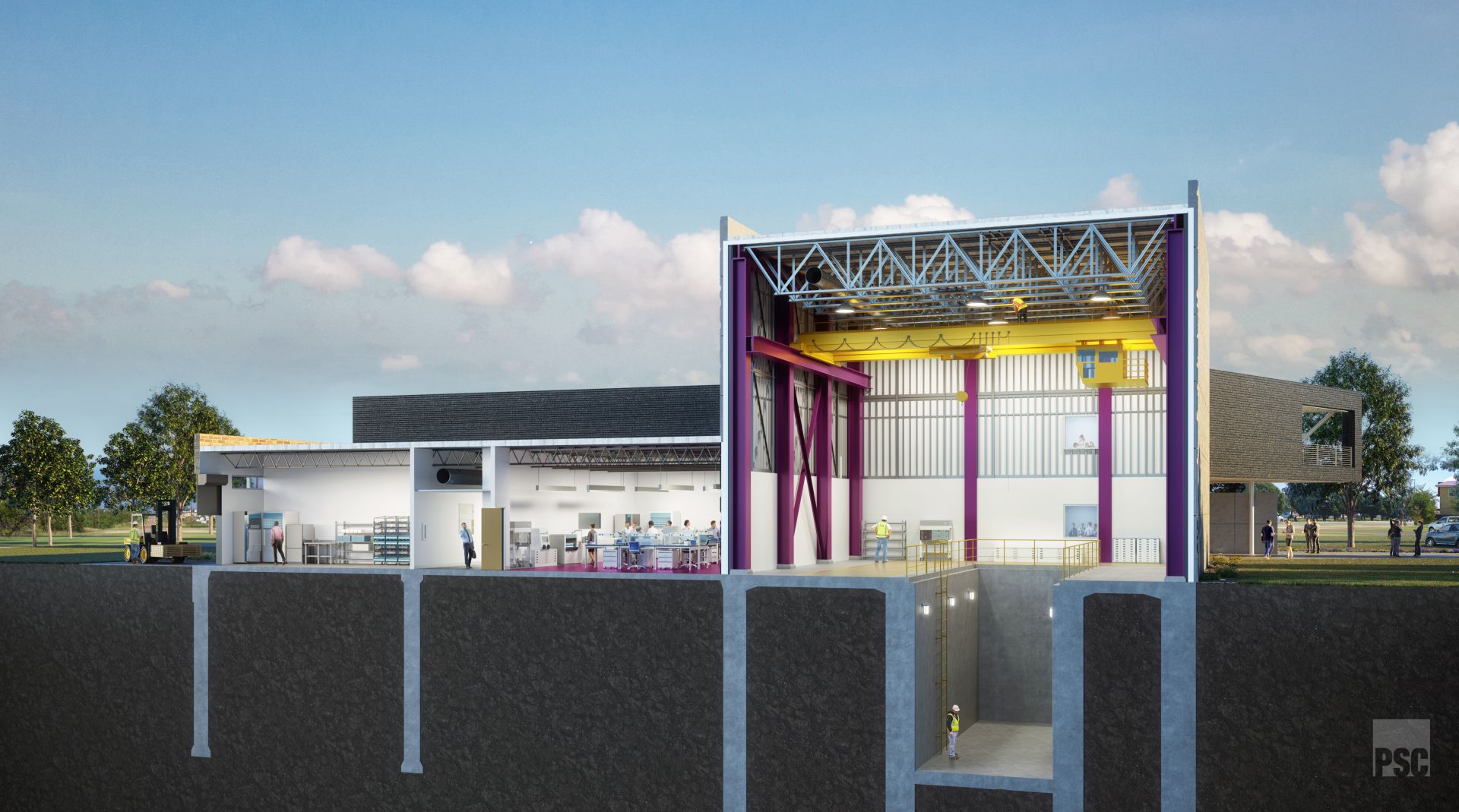A rendering of the Versatile Test Reactor site. Image: INL
LA GRANGE PARK, Illinois – Idaho National Laboratory’s crucial Versatile Test Reactor (VTR) project is the focus of a newly released special issue of Nuclear Science and Engineering, the first and oldest peer-reviewed journal in its field. This special issue of the American Nuclear Society’s flagship journal presents a current snapshot of the nuclear innovation project at INL, which is being developed in partnership among six national labs and a host of industry and university partners.
The Portsmouth Gaseous Diffusion Plant. (Photo: DOE)
The Department of Energy’s Office of Environmental Management has renewed a $2.5 million grant to Ohio University to support community redevelopment around the DOE’s Portsmouth Site. Since 2016, the DOE has provided a total of $8.2 million to the university for work with the communities.
The DOE grant, which began on October 1, will be administered over five years through September 30, 2027. A previous grant expired on September 30.
DOE contractor Savannah River Mission Completion strengthened its ties with Aiken Technical College as the school graduated the first class of Nuclear Fundamentals trainees this summer. (Photo: DOE)
The first 36 students graduated this summer from Savannah River Mission Completion’s (SRMC) Nuclear Fundamentals Certificate program. SRMC is the Department of Energy’s liquid waste contractor at the Savannah River Site (SRS) in South Carolina.
The program, which is a partnership between Aiken Technical College (ATC) and SRMC, is in its inaugural year.
The Philippine Research Reactor-1 building at the University of the Philippines. (Photo: PNRI)
The research reactor known as SATER (Subcritical Assembly for Training, Education, and Research), housed in at the Philippine Research Reactor-1 building at the University of the Philippines in Quezon City, has become operational. As recently reported by the International Atomic Energy Agency, the core of SATER was loaded with 44 fuel rods, bringing the Philippines its first operational nuclear reactor in 34 years. Through this event, the country has moved a big step closer to meeting the government’s goal of adding nuclear power to its energy resources. The reactor is expected to become fully operational by 2023.
Construction of the new Science and Engineering Research Center is underway on the ACU campus. (Photo: ACU)
The Nuclear Energy eXperimental Testing (NEXT) Laboratory at Abilene Christian University in Texas submitted a construction permit application to the Nuclear Regulatory Commission for its molten salt research reactor (MSRR) on August 15. According to ACU, the move represents the first application for a new U.S. research reactor of any kind in more than 30 years, as well as the first-ever university application for an advanced research reactor.
The third cohort of the Nuclear Operator Apprenticeship Program was recognized in a ceremony at Aiken Technical College. (Credit: SRNS)
Twenty-three students in the third cohort of the Savannah River Nuclear Solutions (SRNS) Nuclear Operator Apprenticeship Program graduated recently following their completion of the Nuclear Fundamentals Certificate curriculum at Aiken Technical College (ATC) in South Carolina. The class was the largest ever of operator apprentices to graduate from the program. Those graduates who meet all employment requirements are eligible for hire at the Savannah River Site.
Artist’s rendering of the Westinghouse Electric AP1000 modular reactor. (Image: Westinghouse)
New and immersive internship and development opportunities are being offered through a partnership of Westinghouse Electric Company and the Ukrainian nuclear energy utility Energoatom. Beginning this autumn, more than 60 opportunities will be available for Ukrainian nuclear energy professionals and graduate-level students.
An artist rendering of the Science and Engineering Research Center under construction at Abilene Christian University. The SERC will house the NEXT Lab's new advanced university research reactor sponsored by Natura Resources.
The first university-based molten salt research reactor (MSRR) is one step closer to reality with Abilene Christian University’s Nuclear Energy eXperimental Testing (NEXT) Laboratory recently signing a contract with Teledyne Brown Engineering. After considering more than a dozen engineering firms, the NEXT Lab selected Teledyne Brown to perform the front-end engineering and design work to produce the reactor on the Abilene campus. The contract was described by NEXT Lab director Rusty Towell as “a significant step into the detailed design and construction phase of this project.” The hope is that the 1-MWt MSRR will go critical in 2025.


















.jpeg)